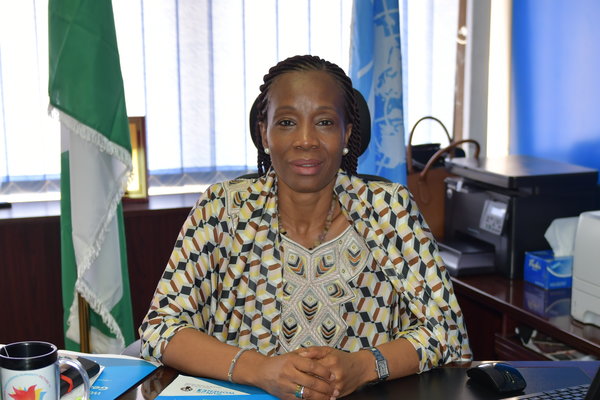TOYIN ADEBAYO, ABUJA
The UN Women is contributing N38 million to the Federal Ministry of Women Affairs to provide palliatives for vulnerable Nigerian women as part of the ongoing efforts to support the Federal Government of Nigeria on the COVID-19 response.
The donation was officially presented today in Abuja, to the Minister of Women Affairs, Dame Pauline Tallen, by the UN Women Representative to Nigeria and ECOWAS, Ms. Comfort Lamptey.
She said that, the funds will be channeled towards the procurement and distribution of relief and hygiene supplies including food items, soap, masks and sanitizers, which will be procured from women-owned businesses.
According to her, “These palliative measures are targeted at reaching 12,600 vulnerable women and girls who have been worst hit by the effects of the crisis, in 14 states across the six geo-political zones in Nigeria.
“Through the oversight and supervision of the Ministry of Women Affairs, in collaboration with women’s organizations and networks in the targeted states, including the Nigeria chapter of the Africa Women Leaders Network (AWLN), the leadership role of women will be underlined throughout this pilot partnership effort: from the process of procurement of the palliatives from women-owned businesses, the identification of vulnerable households in the states in collaboration with women’s organizations, to the monitoring of the distribution of the palliative materials for vulnerable women.
“Women in Nigeria make up 47.8 % of sole owners of microenterprises and 22 % of SMEs, with a high concentration in specific economic sectors, such as wholesale, manufacturing, accommodation, food services and agriculture. These women-led enterprises will be heavily impacted by disruptions in supply chains and closure of markets; impacting on their ability to feed their families and be independent,” said Ms. Lamptey.
“Whilst the pandemic is one that affects all spheres of society, women and girls are being more adversely affected by violence, food insecurity and loss of income. Additionally, women and girls are the bearers of an unfair burden of care. During this time, they are most likely to be responsible for caring and providing for households including sick relatives,” she stated.
She further stated that, the UN Women through its support to the Ministry of Women Affairs will continue to contribute to strengthening the resilience and coping capacities of some of the most affected households, including vulnerable female-headed households, poor women with disabilities, and those affected by conflict in the country. The targeted support is also geared at improving the awareness and adoption of hygiene practices as measures to prevent the target beneficiaries and their communities from contracting the COVID-19 disease.
Earlier, the Minister of Women Affairs, Dame Pauline Tallen thanked UN Women for the gracious donation and show of support.
She highlighted the efforts and resilience of Nigerian women during this challenging time and commended the efforts of frontline workers and journalists for their selfless service. “Support will be prioritized for the most vulnerable women and those women who earn a daily income.”
She also thanked the UN family in Nigeria, under the leadership of the Resident Coordinator, Mr. Edward Kallon, for highlighting the need to prioritize women’s empowerment through the UN-managed Basket Fund to guide the COVID-19 response in Nigeria.
The Executive Director of UN Women, Ms. Phumzile Mlambo-Ngcuka has made the call to governments and stakeholders worldwide to integrate protection policies for women in their COVID response plans: “Where governments or businesses put income protection in place, this can ease these dilemmas, sustain incomes and avoid driving households into poverty. This response must also include those in the informal economy, where most women who work outside home make their livelihood. Such social protection is best directed specifically to women.”

